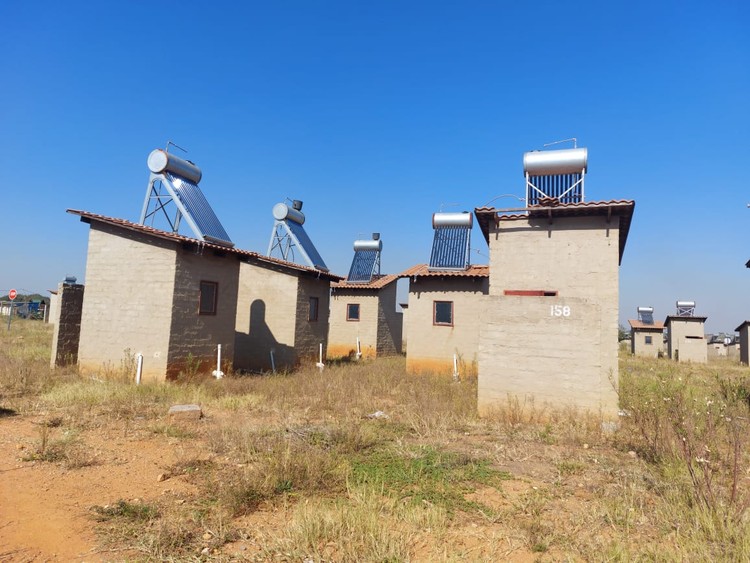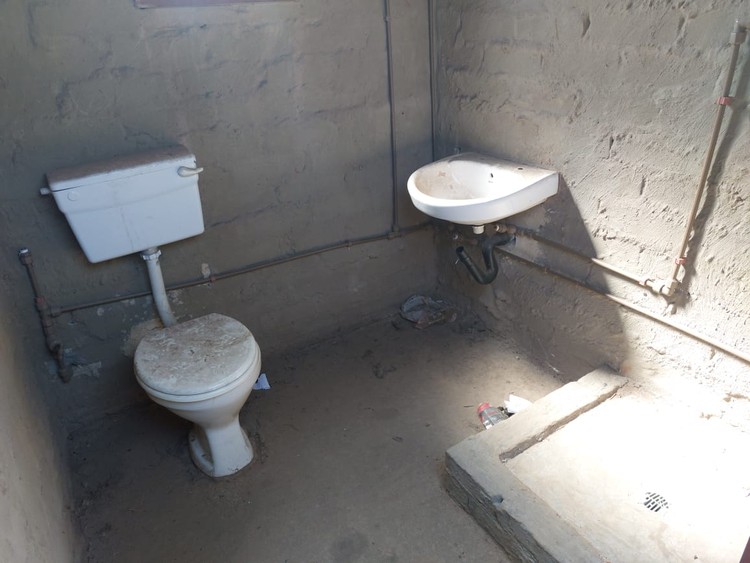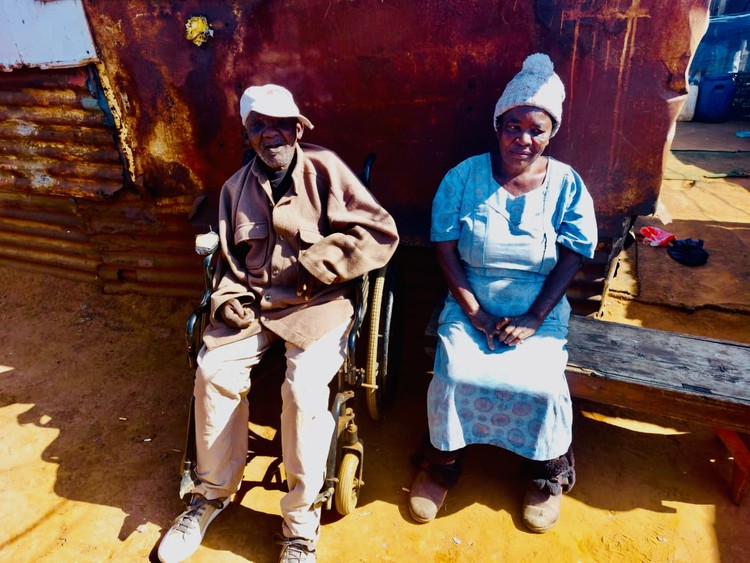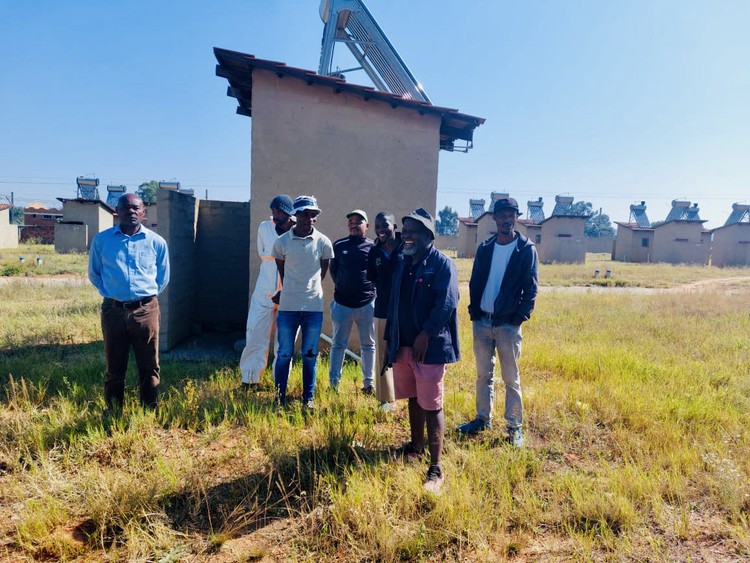Boksburg families refuse to move to serviced sites
Give us houses, Ekurhuleni municipality told
Serviced stands prepared by the City of Ekurhuleni in 2016 have been standing vacant because people refuse to move, saying they were promised houses. Photos: Kimberly Mutandiro
Inside a small fenced-off space at Delmore informal settlement in Boksburg, Ekurhuleni, lives 80-year-old wheelchair user, Freddy Frank and his partner Constance Mpinga. They share the space with their children who live in one shack and tenants who live in two other shacks.
The family is among hundreds who say the government has broken a promise to give them houses.
The shack dwellers have been protesting since July last year against the municipality’s plans to move them to serviced stands in the first phase of its Balmoral housing development. The sites, with toilets and solar-powered showers, are meant to be handed over to beneficiaries in October.
The Balmoral housing development was intended to benefit families living in informal settlements in Boksburg, Ekurhuleni and surrounding communities. Combined, these settlements have more than 3,000 shacks, and people are living in densely populated spaces with little or no services.
According to community leaders, the development was expected to be done in three phases. In 2016, the municipality started building Balmoral phase 1. Phases 2 and 3 were to follow once people moved to phase 1, because many of them are living on land earmarked for the next phases.
The municipality allocated R250-million for the serviced stands.
But to date, only 259 toilets have been built for Phase 1 of the project. The toilets – which consist of a toilet, basin, shower, and solar water heater – are estimated to have cost about R30,000 per toilet.
All the toilets on the serviced stands have been vandalised and no longer have doors, taps, and pipes.
Families like Frank’s in Delmore currently share a few communal chemical toilets and standpipes for water. Because there is no electricity, illegally connected cables hang loosely over shacks. As a result, the settlement has had many fires over the years.
The couple say they have lived in the settlement since 1995 and have both been approved to get a subsidised government house. They are refusing to move to the serviced stands. They want an RDP house that caters to Frank’s needs as an elderly wheelchair user.
“I want a house of my own because life is not easy,” said Frank, who can barely speak after suffering a stroke a few years ago.
Another resident, Rennet Dhlamini, said she moved to Delmore with her husband in May 1994. She registered for a RDP house in 1996 and waited for years until the Balmoral housing project was announced.
Dhlamini’s children and grandchildren have built shacks in the couple’s fenced-off yard. Her shack leaks when it rains so she uses bubblegum to cover all the small holes.
80-year-old wheelchair user Freddy Frank and his partner Constance Mpinga have lived in Delmore informal settlement in Boksburg, Ekurhuleni for nearly two decades.
“In July 2023, the municipality said it would move us to the land next to the toilets. I was surprised because there is no space. My shack is big. Where will my children and grandchildren stay?” asked Dhlamini.
Dhlamini’s daughter, Dudu Mbatha, said, “We will not move into toilets. We want real houses.”
Community leader Joseph Mashabane said that they asked the municipality on a number of occasions on why the project has taken so long to complete. He said they have even approached the Public Protector’s Office for help, but to no avail.
“We have heard so many stories, and two mayors later, we still don’t have answers. A large sum of money was spent on shoddily built toilets, yet the municipality refuses to be accountable. We will not move until we get real houses,” said Mashabane.
Municipal spokesperson Zweli Dlamini confirmed that the project started in June 2016 with the construction of 259 serviced stands. “The development is an Upgrading of Informal Settlements Project. When funding from the National and Provincial departments of Human Settlements becomes available, construction of top structures for qualifying beneficiaries will begin,” he said.
Dhlamini said that approximately 3,800 structures in the informal settlements are part of the de-densification for phases 2 and 3 of the development. “Although water and sewerage systems have been built, the majority of the settlement would need to be resettled for work in this area to be done,” he added.
Dhlamini said, “The project’s completion will heavily depend on whether the community continues to want to change the township layout and, if necessary, develop alternative land.
Leaders from the Delmore informal settlement say they want houses not serviced stands.
Support independent journalism
Donate using Payfast

Don't miss out on the latest news
We respect your privacy, and promise we won't spam you.
Next: Bid to save legendary Lovedale Press
Previous: Environmental activists win against Shell in appeal court
© 2024 GroundUp. This article is licensed under a Creative Commons Attribution-NoDerivatives 4.0 International License.
You may republish this article, so long as you credit the authors and GroundUp, and do not change the text. Please include a link back to the original article.
We put an invisible pixel in the article so that we can count traffic to republishers. All analytics tools are solely on our servers. We do not give our logs to any third party. Logs are deleted after two weeks. We do not use any IP address identifying information except to count regional traffic. We are solely interested in counting hits, not tracking users. If you republish, please do not delete the invisible pixel.




